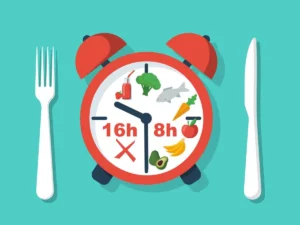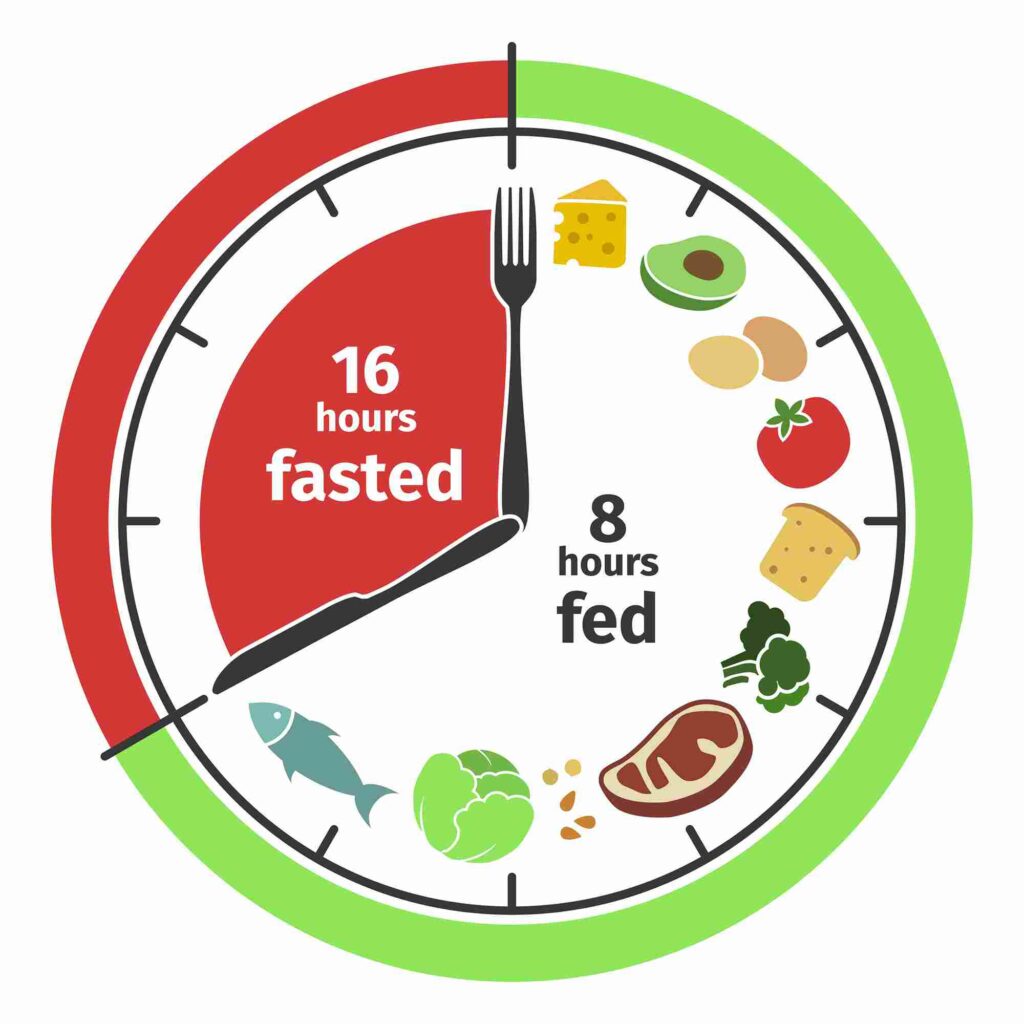If you’re looking to lose weight, you may have heard about intermittent fasting. This is a diet trend that has been gaining popularity in recent years. But what is it? And can it help you lose weight? In this blog post, we will answer these questions and more. We’ll discuss what intermittent fasting is, how it works, and the benefits of using this approach to lose weight.
Contents
What Is Intermittent Fasting?
 Intermittent fasting is an eating style that cycles between periods of feasting and abstaining. It is recently becoming more popular as a weight loss and health boost strategy because of its potential to improve metabolic health. This type of fasting generally involves 16-24 hour periods of fasting followed by short eating windows. Such as eating only within 8 hours each day or every other day.
Intermittent fasting is an eating style that cycles between periods of feasting and abstaining. It is recently becoming more popular as a weight loss and health boost strategy because of its potential to improve metabolic health. This type of fasting generally involves 16-24 hour periods of fasting followed by short eating windows. Such as eating only within 8 hours each day or every other day.
While it may sound restrictive, intermittent fasting can be flexible and tailored to fit your lifestyle. The key is to find what works best for you and the way your body responds. Some people may find they need more time between meals while others may do well with less. It is important to listen to your body and adjust accordingly.
Different Types
When it comes to intermittent fasting for weight loss, there are a few different types you can choose from. Some of the most popular methods include:
- Time-Restricted Eating: Eat within an 8-hour window each day and fast for the remaining 16 hours.
- Alternate Day Fasting: Fast every other day, with no calorie restrictions on non-fasting days.
- 5:2 Diet: Fast for two non-consecutive days per week and eat normally the other five days.
The different methods of intermittent fasting are designed to help you reach your weight loss and health goals. Generally speaking, the longer the fasting period, the more effective it is for fat and weight loss. However, these long periods can be difficult for some to maintain. So it’s important to find a method that works best for you.
How Intermittent Fasting And Weight Loss Are Linked?
Widely popular amongst health and fitness enthusiasts, intermittent fasting (IF) is a dietary strategy that involves cycling between periods of eating and fasting. By cutting out certain meals or reducing the window in which you can eat, you can significantly reduce your overall daily calorie intake.
Intermittent fasting and weight loss are closely related. And IF is an effective way to reduce body fat when combined with regular physical activity. Research has shown that intermittent fasting diets can lead to greater weight loss than traditional calorie-restricted diets, especially in those who are overweight or obese.
Therefore, the connection between intermittent fasting and weight loss is very clear. When properly implemented and combined with physical activity, IF can be a great way to reduce body fat and reach significant weight loss goals. It may also improve your overall health by improving certain metabolic markers like blood sugar levels, cholesterol levels, and insulin sensitivity.
While you should always speak to your doctor before starting a new diet or weight loss program. Intermittent fasting may be an effective way to reduce body fat and lose weight in the long run. It’s important to maintain a healthy lifestyle while on any diet program and combine IF with regular physical activity for optimal results.
How Does Intermittent Fasting For Weight Loss Work?
 Intermittent fasting for weight loss works by limiting the number of calories you consume during specific periods. During these fasting windows, your body is able to burn through its stored fat reserves, resulting in weight loss. It also helps regulate hormones related to appetite control and stress management, which can further contribute to weight loss.
Intermittent fasting for weight loss works by limiting the number of calories you consume during specific periods. During these fasting windows, your body is able to burn through its stored fat reserves, resulting in weight loss. It also helps regulate hormones related to appetite control and stress management, which can further contribute to weight loss.
When you start intermittent fasting for weight loss, it’s important to create a plan that fits your lifestyle and the amount of weight you want to lose. You can start by setting a fasting window of 12–16 hours, where you eat within an 8-hour period each day.
As you get more comfortable with this practice, you can extend your fasts up to 24 hours or longer, depending on your goals. It’s important to stick to the plan you’ve set for yourself in order to see results. Intermittent fasting can also involve caloric restriction, where you aim to consume fewer calories than normal during specific periods of time.
This type of fasting can involve eating a certain number of meals throughout the day. During these set meals, it’s important to focus on healthy eating habits. Such as avoiding highly processed foods and added sugars.
What Are The Pros And Cons?
If you’re considering intermittent fasting for weight loss, you need to consider the pros and cons.
Pros
- Reduces calorie intake: One of the biggest benefits of intermittent fasting is that it helps to reduce overall calorie intake. When you’re not eating all day and only consuming food during certain windows of time, you’re naturally going to eat less than if you were snacking throughout the day.
- Improves metabolic health: Intermittent fasting has been linked to improvements in metabolic health, including improved insulin sensitivity and cholesterol levels. Reduced calorie intake is a key factor in improving metabolic health, but fasting itself also has metabolic benefits.
- Encourages healthy habits: Intermittent fasting encourages healthy habit formation in general. When you’re not eating throughout the day, it can be easier to practice mindful eating and pay attention to hunger cues.
- Improves cellular repair: Finally, intermittent fasting has been linked to improved cellular repair and rejuvenation. Fasting helps to activate autophagy, a process by which old or damaged cells are recycled and replaced with new, healthy cells.
Cons
- Starvation mode: One of the biggest dangers of intermittent fasting is that it can lead to starvation mode, a state in which your body slows down its metabolism and begins storing fat instead of burning it for energy.
- Difficult to maintain over time: Intermittent fasting may be more difficult to maintain over the long term than other diets. It requires a lot of dedication and commitment, and it can be hard to stick with it if you don’t have strong willpower.
- Difficult for athletes: Intermittent fasting can be particularly difficult for athletes who need to fuel their bodies with frequent meals in order to perform at peak levels. It’s not recommended for athletes or people who are involved in high-intensity activities.
- May cause dehydration: Intermittent fasting can also lead to dehydration, as it restricts the amount of fluids that you can consume during fasting periods. This is especially true if your diet does not include enough electrolytes and minerals.
Overall, it’s important to weigh the pros and cons of intermittent fasting before deciding if it’s right for you. It can be an effective tool for weight loss and improved metabolic health, but it may not be the best choice for everyone. Talk to your doctor before starting any new diet or health regimen.
Who Should Not Try Intermittent Fasting?
 Intermittent fasting can be beneficial for many people, but it is not suitable for everyone. Here are a few groups of people who should avoid intermittent fasting:
Intermittent fasting can be beneficial for many people, but it is not suitable for everyone. Here are a few groups of people who should avoid intermittent fasting:
1. Children and adolescents: Intermittent fasting can be dangerous for children and adolescents, as it could lead to malnutrition and interfere with their growth and development.
2. Women who are pregnant or breastfeeding: Pregnant and breastfeeding women require a regular supply of nutrients in order to stay healthy and provide for their baby’s development. Intermittent fasting can be too restrictive and could lead to nutritional deficiencies.
3. People with diabetes: Individuals with type 1 or type 2 diabetes should not try intermittent fasting without the supervision of a physician, as it may interfere with their blood sugar levels and insulin sensitivity.
4. People with eating disorders: Intermittent fasting can be unhealthy and triggering for individuals who are recovering from an eating disorder or have a tendency toward disordered eating.
5. Individuals with certain medical conditions: Finally, it may not be appropriate for people with low blood pressure, gallbladder disease, or certain hormone imbalances. Additionally, it is not recommended for those taking certain medications, such as insulin or blood pressure medication.
It is important to always speak with a healthcare provider before starting any type of fasting program. This will ensure that intermittent fasting is safe and appropriate for your individual needs.
How Much Weight Can You Lose In a Week With Intermittent Fasting?
 The amount of weight you can lose in a week with intermittent fasting depends on your individual circumstances. If you are following a strict calorie-controlled diet and engaging in regular physical activity, then it is possible to lose up to 2 or 3 pounds per week.
The amount of weight you can lose in a week with intermittent fasting depends on your individual circumstances. If you are following a strict calorie-controlled diet and engaging in regular physical activity, then it is possible to lose up to 2 or 3 pounds per week.
However, if you are just starting out with intermittent fasting and have not yet established an effective calorie deficit. Then you may only be able to lose one pound per week.
While the amount of weight you can lose in a week is important, it’s also important to keep in mind that intermittent fasting can help you adopt healthy habits for the long term. These healthy habits should result in further weight loss over time, even if the initial weight loss is slow.
Intermittent fasting has been shown to reduce insulin levels, which can help with fat-burning and weight loss over time. So be sure to stick to your plan and resist the temptation to give up after a few weeks if you don’t see quick results.
Conclusion
In conclusion, intermittent fasting and weight loss may go hand in hand. But that doesn’t mean you should jump right into it. It’s important to consider your lifestyle and health before trying out any new diet or weight loss plan. Intermittent fasting may be beneficial for some people. But is not suitable for everyone.
If you are considering trying intermittent fasting as a way to lose weight, make sure you do your research and consult a healthcare professional. Ultimately, it’s important to find a weight loss strategy that works best for you.
If you’re interested in learning more, seek the expertise of FitMantra! Our experienced nutritionists can be easily accessed with just a few clicks. And will offer personalized support to assist you in achieving your fitness goals. Our online nutrition counseling, and weight loss program has been designed to help you shed those unwanted pounds! Don’t forget to download our Fitness App available on Android.
